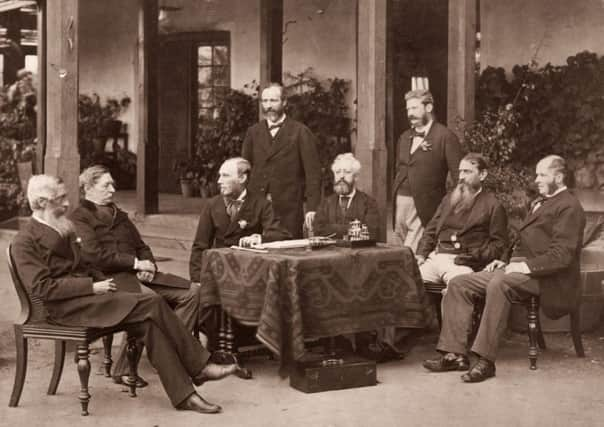Book review: The Tears of the Rajas


More than half a century ago a retired major told me that in India now he was greeted by Indians saying beseechingly: “Sahib, will you please return?” Even then this seemed improbable to me, and not only because the poor major was in an emotional state, half-way through a bottle of Johnnie Walker. The truth is of course that, whatever benefits British rule brought to India and its people – and the benefits were real and enduring – government by foreigners is nearly always resented. General John Low, the central figure or hero of Ferdinand Mount’s wonderfully detailed, fascinating, intelligent and level-headed history of a century of empire, spoke of the “natural hatred” which the Indians felt for the British.
Mount tells the story principally through the lives of the Lows and their extended family. John Low, an ancestor of the author – also, as it happens, of David Cameron – came from Clatto in Fife. Like many Scots lairds whose income didn’t match their social status, he went to India as a young man, little more than a boy, in search of fortune. He served in the army of the East India Company, eventually becoming British Resident in a succession of princely states. The Resident was the political adviser to the reigning Nawab or Raja; in effect, he managed the state and was responsible for raising its revenue, a portion of which was transmitted to the company. Low was diligent and honourable, but never forgot that he was an agent in the exploitation of the native population.
Advertisement
Hide AdThe extraordinary feature of our Indian Empire is that it was created by private enterprise. It wasn’t the British government that conquered much of India and dominated those princely states which remained nominally independent, but a private trading company with its headquarters in Leadenhall Street in the City of London. The East India Company was one of the first and greatest of what we now call “multinationals”, an international player in its own right, controlling, for instance, the opium trade with China and employing its private army which came to number some 200,000 men, to promote and secure its commercial interests.
Mount writes: “The British empire in India was the creation of merchants and it was still at heart a commercial enterprise, which had to operate at a profit and respond to the ups and downs of the market. |Behind the epaulettes and the jingle of harness, the levees and the balls at Government House, lay the hard calculus of the City of London.” Few benefited more from its activities than the Scots. Even in the late eighteenth century, a generation before John Low sailed east, Henry Dundas, the master of Scottish politics, spoke of India as “the bran-tub“ of Scotland.
The company was brutal, greedy and unscrupulous. It extended its power by war, bullying and rapacity. It deposed native rulers who were insufficiently obedient to its demands. It frequently over-reached itself, as when engaging in the disastrous First Afghan War of 1839 – an enterprise which John Low opposed and warned against. It provoked frequent rebellions and mutinies of native troops. The last and most dangerous of these was the Great Mutiny of 1857, which was suppressed with a ruthless brutality and the mass hangings not only of rebels but of innocent, though suspect, civilians. We would undoubtedly judge the men responsible for these atrocities to have been war criminals. But there was no war crimes tribunal then.
That mutiny, however, did for the company. The government of British India was reformed, the Indian Civil Service established, the company’s army brought under the control of the War Office. Corruption was eradicated and it can be argued that for the remaining 90 years of the Empire, we governed, or tried to govern, in the interest of India and its inhabitants rather than in the interest merely of profit. The Indian administration which Kipling knew and revered was very different from the rapacious government of the East India Company.
Mount’s book is full of horrors, but he maintains a judicious balance. The men – and women – who went out to India in search of fortune were remarkable people, enduring danger, hardship, family bereavement, separation from their children (usually sent home to Britain when very young) loneliness, the likelihood of fever and an early grave. They were careerists, many of whom formed a deep love for India and its people, and a sense of what they regarded as a civilising mission. If there was much that was shameful in the first century of our Indian empire, there was more that was admirable in the second.
This is a wonderfully rich and detailed book, impossible to summarise in a brief review. Mount writes with grace and enthusiasm, a keen eye for character, wit and sympathy. He responds to the glamour of empire, while never forgetting that it was tarnished. “Sometimes,” he reflects, “strolling through the ruins of earlier civilizations, we idly wonder what it must have been like to live through the end of one of them. Now we know for ourselves.”
Advertisement
Hide AdNow it is Indian companies which buy and take over British ones, keeping only the brand names, just as we once kept Indian princes in nominal power, but in reality subservient. And not even a bleary-eyed major would pretend that the Indians today regret the dissolution of the British empire and call on the sahibs to return.
FOLLOW US
SCOTSMAN TABLET AND MOBILE APPS